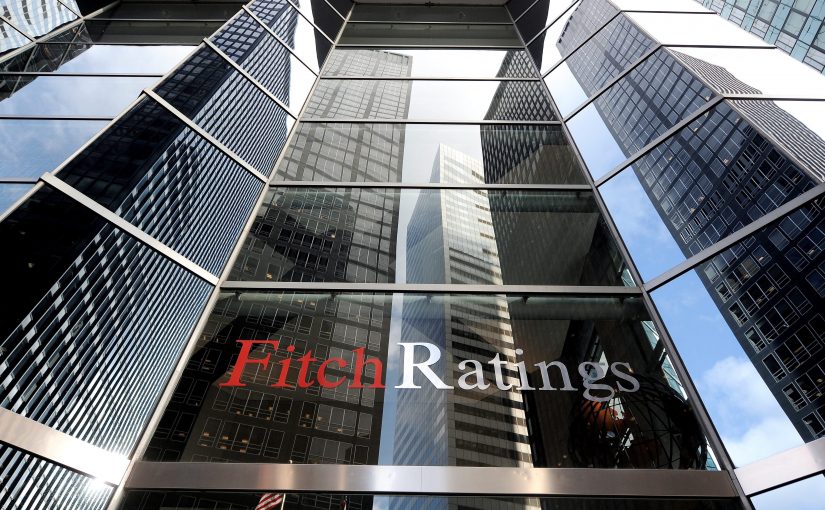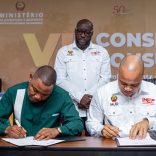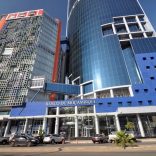Mozambique, Zambia ink agreement on one-stop border
Fitch affirms Mozambique at ‘CCC’

File photo: Lusa
London – 11 Mar 2022
Fitch Ratings has affirmed Mozambique’s Long-Term Foreign-Currency Issuer Default Rating (IDR) at ‘CCC’.
Fitch typically does not assign Outlooks or apply modifiers for sovereigns with a rating of ‘CCC’ or below.
A full list of rating actions is at the end of this rating action commentary.
Key Rating Drivers
Substantial Credit Risk: Mozambique’s ‘CCC’ rating reflects elevated government debt levels, limited sources of financing combined with high fiscal and external financing needs, still unresolved public-sector debt liabilities, low GDP per capita, weak governance indicators, a difficult security situation and vulnerability to natural disasters. The potential for a significant acceleration in economic growth over the coming years, driven by the LNG sector, provides an upside to public finances and creditworthiness.
Stronger Growth Ahead, But Risks Persist: The Mozambican economy expanded by a modest 2.2% in 2021, after contracting by 1.3% in 2020, but Fitch expects an acceleration to 4.5% in 2022 and 8% in 2023. Further easing of pandemic-induced restrictions in January and the resumption of the construction of Total’s USD20 billion (122% of GDP) LNG project will boost domestic demand. The likely beginning of production at ENI’s Coral Sul LNG project in 4Q22 will be an additional driver of growth. Economic prospects remain sensitive to adverse developments in the security situation in Cabo Delgado (where the LNG megaprojects are located) and the evolution of the pandemic in Mozambique. Only 39% of the population was fully vaccinated at end-February 2022.
Security Situation Improved: Security risks have eased since our last review, largely due to the deployment of military forces from Rwanda and the Southern African Development Community (SADC) in Cabo Delgado in June 2021. Islamist insurgents have been pushed into remote areas and their major bases dismantled. Nevertheless, significant security risks remain with the potential to adversely affect the LNG projects.
LNG Projects To Suffer Delays: Total is likely to resume the construction of its LNG project in 2022, but production is now likely to start only in 2026, two years later than expected at our previous review. According to official projections, gas projects were expected to boost GDP growth by an additional 2pp in 2024, but this is likely to be revised down significantly due to this postponement. We expect ExxonMobil’s final investment decision on its USD30 billion project in 2022.
Fiscal Deficit to Remain Moderate: Fitch forecasts the fiscal deficit (including grants) to fall modestly to 3.0% of GDP in 2022 and 2.8% in 2023, from an estimated 3.2% of GDP in 2020, reflecting an increase in grant disbursements and rising tax revenue to GDP as collection from ENI’s LNG off-shore project are set to begin in 4Q22. The expenditure profile is rigid, with wages and interests estimated to equal 53% of total spending in 2021. The coupon rate on Mozambique’s 2031 USD900 million Eurobond will increase to 9% in 2024 from 5% currently. Expenditure under-execution, most notably in terms of capital spending, could ease fiscal financing requirements.
Financing Constraints to Persist: Fitch estimates Mozambique’s gross fiscal financing needs at 7.1% of GDP in 2022, including net lending to state-owned enterprises (SOEs; 0.3% of GDP) and amortisations (4.1% of GDP). We expect Mozambique to meet these financing needs through a combination of external official financing, domestic market issuance and government deposits. Financing sources remain constrained. There are signs of increasing saturation of the domestic government bond market, following the increase in the government’s domestic borrowing in recent years. While we expect domestic debt to be rolled over given ample liquidity in the banking sector, net financing increases could become more challenging due to banks’ internal limits. Authorities are currently negotiating a multi-year Extended Credit Facility with the IMF that would ease the country’s financing conditions as well as serve as a policy anchor.
Government Debt Will Remain High: The government debt-to-GDP ratio declined to 112.4% at end-2021, largely reflecting the impact of the 15% appreciation of the metical (80% of debt is foreign-currency denominated) as well as strong nominal GDP growth. Our government debt figure includes guaranteed loans currently in arrears to two former SOEs, worth 10% of GDP at end-2021. Although the government has challenged the validity of both SOE guarantees through legal disputes in the English courts, the risk remains that they may crystallise as a liability for the central government, depending on the outcome of the legal proceedings. Fitch forecasts debt to decrease to 104.5% and 97.6% of GDP in 2022 and 2023, respectively, amid an acceleration of GDP growth and only a mild depreciation of the exchange rate.
Common Framework Remains Possibility: Mozambique has not made a decision regarding its participation in the G20/Paris Club Common Framework to seek debt relief from official creditors, which we view as a distinct possibility. Comparable treatment by private creditors would likely be a condition for a deal. This could affect Mozambique’s sole 2031 Eurobond. Fitch would likely view a restructuring of debt to private sector creditors as a distressed debt exchange and hence a default.
Current Account Deficit to Widen: Fitch forecasts the current account deficit to widen from an estimated 24.4% of GDP in 2021 to 36.5% of GDP in 2022, largely reflecting an increase in imports related to the LNG megaprojects. International reserves fell to USD3.7 billion at end-2021 as the central bank lowered the banking sector’s FX reserve requirement ratio from 34.5% to 11.5%. We expect international reserves to decline to USD2.9 billion in 2022 but to then increase to USD 3.3 billion in 2023. Mozambique is vulnerable to extreme weather events.
Inflation to Accelerate: Fitch expects the central bank to hike its key policy rate by 125bp in 2022 to address rising inflationary pressures. The central bank tightened policy significantly in early 2021 by increasing its policy rate by 300bps to 13.25% to address rising inflationary risks partly derived from the sharp depreciation of the metical in 2020. While the metical has since strengthened, inflation reached 7.8% in January 2022, and we forecast the full-year average at 8.5% on the back of higher oil and food prices.
ESG – Governance: Mozambique has an ESG Relevance Score (RS) of ‘5’ for both Political Stability and Rights and for the Rule of Law, Institutional and Regulatory Quality and Control of Corruption. Theses scores reflect the high weight that the World Bank Governance Indicators (WBGI) have in our proprietary Sovereign Rating Model. Mozambique has a low WBGI ranking at 22.3, reflecting the absence of a recent track record of peaceful political transitions, violence associated with the insurgency, relatively weak rights for participation in the political process, weak institutional capacity, uneven application of the rule of law and a high level of corruption.
Rating sensitivities
Factors that could, individually or collectively, lead to negative rating action/downgrade:
Public Finances: Increased likelihood of a probable default event, for example a restructuring of sovereign market instruments through participation in the G-20/Paris Club Common Framework.
Factors that could, individually or collectively, lead to positive rating action/upgrade:
Public Finances: A substantial decline in the public debt-to-GDP ratio, for instance as a result of sustained low budget deficits, and greater clarity that ongoing litigation will not impair Mozambique’s willingness and ability to service its debt. A sustained easing of financing constraints, for example as a result of an IMF programme that unlocks additional external financing.
Macroeconomic: Greater confidence in medium-term growth prospects, through the timely progress of the LNG megaprojects.
Sovereign Rating Model (SRM) and Qualitative Overlay (QO)
In accordance with its rating criteria, Fitch’s sovereign rating committee has not utilised the SRM and QO to explain the ratings in this instance. Ratings of ‘CCC+’ and below are instead guided by the rating definitions.
Fitch’s SRM is the agency’s proprietary multiple regression rating model that employs 18 variables based on three-year centred averages, including one year of forecasts, to produce a score equivalent to a LT FC IDR. Fitch’s QO is a forward-looking qualitative framework designed to allow for adjustment to the SRM output to assign the final rating, reflecting factors within our criteria that are not fully quantifiable and/or not fully reflected in the SRM.
Best/Worst Case Rating Scenario
International scale credit ratings of Sovereigns, Public Finance and Infrastructure issuers have a best-case rating upgrade scenario (defined as the 99th percentile of rating transitions, measured in a positive direction) of three notches over a three-year rating horizon; and a worst-case rating downgrade scenario (defined as the 99th percentile of rating transitions, measured in a negative direction) of three notches over three years. The complete span of best- and worst-case scenario credit ratings for all rating categories ranges from ‘AAA’ to ‘D’. Best- and worst-case scenario credit ratings are based on historical performance. For more information about the methodology used to determine sector-specific best- and worst-case scenario credit ratings, visit https://www.fitchratings.com/site/re/10111579.
Refernces for Substantially Material Source Cited as Key Driver of Rating
The principal sources of information used in the analysis are described in the Applicable Criteria.
ESG Considerations O
Mozambique has an ESG Relevance Score of ‘5’ for Political Stability and Rights as World Bank Governance Indicators have the highest weight in Fitch’s SRM and are therefore highly relevant to the rating and a key rating driver with a high weight. As Mozambique has a percentile rank below 50 for the respective Governance Indicator, this has a negative impact on the credit profile.
Mozambique has an ESG Relevance Score of ‘5” for Rule of Law, Institutional & Regulatory Quality and Control of Corruption as World Bank Governance Indicators have the highest weight in Fitch’s SRM and are therefore highly relevant to the rating and are a key rating driver with a high weight. As Mozambique has a percentile rank below 50 for the respective Governance Indicators, this has a negative impact on the credit profile.
Mozambique has an ESG Relevance Score of ‘4’for Human Rights and Political Freedoms as the Voice and Accountability pillar of the World Bank Governance Indicators is relevant to the rating and a rating driver. As Mozambique has a percentile rank below 50 for the respective Governance Indicator, this has a negative impact on the credit profile.
Mozambique has an ESG Relevance Score of ‘4’ for Creditor Rights as willingness to service and repay debt is relevant to the rating and is a rating driver for Mozambique, as for all sovereigns. As Mozambique has a fairly recent restructuring of public debt in 2020, this has a negative impact on the credit profile.
Except for the matters discussed above, the highest level of ESG credit relevance, if present, is a score of ‘3’. This means ESG issues are credit-neutral or have only a minimal credit impact on the entity, either due to their nature or to the way in which they are being managed by the entity. For more information on Fitch’s ESG Relevance Scores, visit www.fitchratings.com/esg.












Leave a Reply
Be the First to Comment!
You must be logged in to post a comment.
You must be logged in to post a comment.